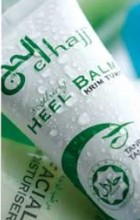 Eco-labels are becoming increasingly evident in the cosmetics industry. Ethical consumers are looking for organic, natural, cruelty-free and similar logos on their cosmetic products. However, a new label is emerging that is targeted at one of the fastest growing consumer groups in the world. The Halal cosmetics label is designed for Muslim consumers, comprising 20% of the global population.
Eco-labels are becoming increasingly evident in the cosmetics industry. Ethical consumers are looking for organic, natural, cruelty-free and similar logos on their cosmetic products. However, a new label is emerging that is targeted at one of the fastest growing consumer groups in the world. The Halal cosmetics label is designed for Muslim consumers, comprising 20% of the global population.
The Halal label is already well-established in the food industry. It has been gaining popularity in the cosmetics industry since the Malaysian government introduced the Halal cosmetics standard (MS 2200: 2008) in June 2010. The Halal label is given to cosmetic and personal care products that meet the strict rules of Sharia law. Like natural / organic standards, the Halal standard has a permitted and prohibited set of ingredients.
The Halal label appeals to Muslim consumers seeking integrity and authenticity in their cosmetic and personal care products. Concerns about animal-derived ingredients – such as gelatine and collagen – in cosmetic products are fuelling demand. Some consumers perceive such products as ethical as they typically avoid such ingredients.
International sales of Halal-certified cosmetics and personal care products are upwards of USD 5 billion. A growing number of cosmetic and ingredient firms are taking up Halal certification in Asia. The highest adoption rates are in Muslim countries where multinationals that include Colgate-Palmolive and Avon have launched certified products. As will be shown at the Asia-Pacific edition of the Sustainable Cosmetics Summit, international chemical firms like BASF and CP Kelco are also getting ingredients certified for such markets.
At present, 57 certification agencies are authorised to certify products according to the Halal cosmetics standard. Although the highest adoption rates are in countries like Malaysia and Indonesia, certification is also catching on in Europe and North America. In the latter regions, a growing number of Muslim consumers are interested in Halal-certified products. However, these products often fall short in terms of their ecological credentials as the formulations are similar to conventional cosmetics.
Realising this, some companies have started to formulate natural / organic cosmetics with Halal certification. Saaf Pure Skincare was launched in the UK to appeal to Muslim consumers seeking organic skincare products that adhere to Sharia principles. The products are certified organic by the Soil Association and certified Halal by European Halal Services. The brand is developing an international presence, with products exported to Europe, the Middle-East and North America.
Ecovia Intelligence (Organic Monitor) sees high potential for such products in the Middle-East and Asia. In many of these countries, the market for natural & organic cosmetics is growing by over 20% a year. Rising consumer affluence, coupled with growing knowledge of cosmetic formulations, is making consumers pay a premium for cosmetics that meet their ethical / religious beliefs. However, they have to decide between Halal-certified conventional cosmetics and natural & organic products not meeting Sharia rules. With a lack of local brands of natural & organic cosmetics in these regions, there is a clear gap in the marketplace. A major challenge is formulating cosmetic products that meet two or more standards, as many European brands have discovered.
Sustainable Cosmetics Summit
The potential of halal cosmetics, as well as the formulation challenges of developing natural & organic personal care products, is regularly featured in the Sustainable Cosmetics Summit. This executive summit now takes place in the major geographic regions of the world: Europe, North America, Latin America and the Asia-Pacific. More details are on the website
Related Report: #5501-60 The Middle-Eastern Market for Natural & Organic Cosmetics
Posted: November 1st 2012
For permission to publish our research insights, please contact our media department

